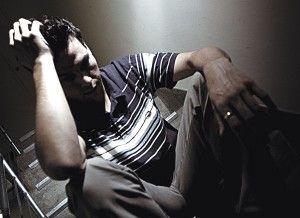Thursday

I'm OK Depressed, You're OK Depressed
I listened to an hour-long podcast with the author of The Noble Lie: When Scientists Give the Right Answers for the Wrong Reasons . It sounds like a great book and the podcast is excellent. The podcast begins with a discussion of the suspicious background of characterizing excessive drinking as a "disease." After America emerged from Prohibition and heavy drinking re-emerged as a recognizable problem, preachers were helping people. The medical profession, though, wanted to get involved in the treatments, so it hired a PR man for help. At the same time, Alcoholics Anonymous was emerging. The rest is dysfunctional history.
But doctors, who had had an interest in this for a long time, thought that they should be the first line of treatment of people who were alcoholic. Lot of trouble getting purchase on the resources and the imagination of the people. They engaged a public relations expert, at the end of the 1930s, who was himself a recovering alcoholic--how doctors could sell themselves as the primary treaters of alcoholism. This guy came up with a very simple idea--wrote a paper, published in their Quarterly Journal of Alcohol Studies; said the way to do this was to turn alcoholism into a disease. If you convince the world that this was a disease, then they will come to you for treatment because you treat diseases. Happened to be about the same time that Alcoholics Anonymous (AA) was taking off. These two lines of thinking--disease and to be treated through AA--converged. Became a powerful and quickly the dominant idea. Important to remember that the idea that alcoholism is a disease was invented by a public relations guy. Doctors who study diseases--and what we usually mean by a disease is a kind of suffering that has a bio-chemical dysfunction behind it. Can find it under the microscope. They spent years looking for it under the microscope and have never succeeded even to this day. Always telling us they are on the verge of it; some combination of neuroscience and genetics. But, while they've been pretty good at figuring out some of the neurological consequences of drinking, and chemical consequences of addiction--the idea that it originates in the body still hasn't been proved. Frankly, I'm not sure it's ever going to be. What you have is a myth.
The discussion about depression is just as good. It begins with the observation that the Book of Job is one of the earliest written accounts of depression, then shoots forward to today's big business of depression diagnosis and treatment. Everyone, it would appear, is depressed. It's not surprising. Life is hard. People get down. They always have and, this side of Eden, always will. But big medicine wants us to think it's abnormal. Excerpt:
Just as the doctors wanted to get alcoholism under their purview, as psychiatrists were trying to get depression under their purview, one of the things they seized upon was redefining depression as a series of symptoms as opposed to an overall impression that a person has or makes. They did that quite nicely by coming up with these 9 criteria. But a study was done that shows that people who are recently bereaved show up as depressed. If you give this test to somebody who just had a death in the family, it's very likely they are going to show up with all the signs of clinical depression--trouble sleeping, etc. Flies in the face of common sense, and in the face of justice. Do we really want to be calling our bereaved people ill, sick? Not to mention, do we want to think about taking Prozac because your wife died. Happened that the woman who did that research was also on the committee that was making the definition of depression over again--in the early 1970s. So they decided you were not depressed if your symptoms were a result of bereavement, unless they persisted for a long time--ultimately two months. Could argue you should be depressed for a year. Arbitrary. But at least they carved out an exception. Achilles' heel in this whole scheme, the bereavement exception.
The alcoholism discussion, incidentally, dovetails nicely with my piece of sarcasm, "Drunk and Driven."
